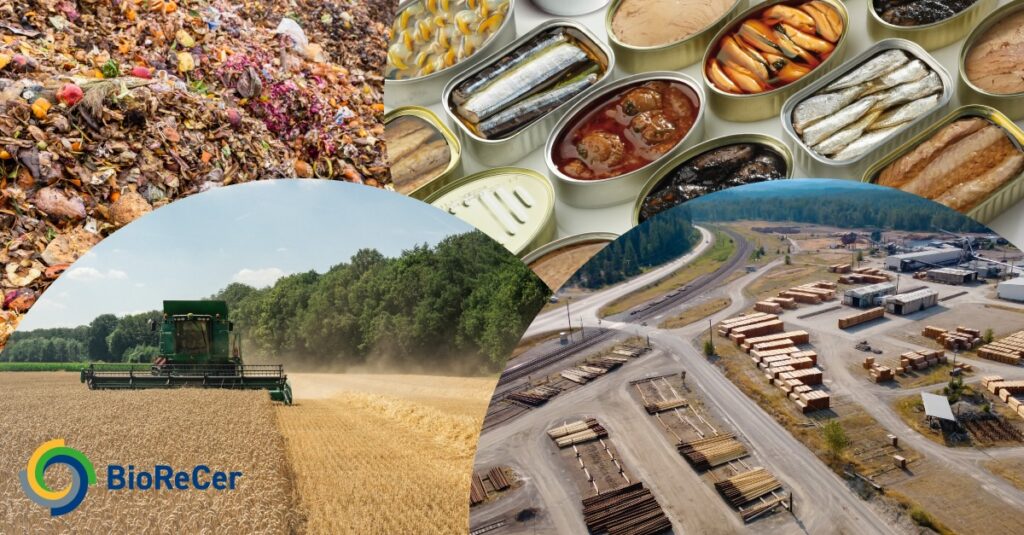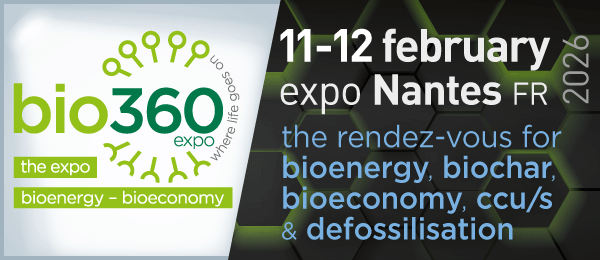
The European bioeconomy emphasises the valorisation and sustainable use of biological resources. With increasing awareness of climate change and environmental degradation, the transition to a bio-based economy is seen as a crucial step towards sustainability. Biological residues and waste, including food waste, organic municipal waste and by-products from forestry, agriculture and fishery can significantly contribute to the EU’s green transition, which is expected to deliver substantial environmental and economic benefits.
Biological waste is often viewed as a burden and incinerated or discarded although it holds potential as renewable resource to substitute fossil feedstock. However, insufficient certification of biological feedstock and value chains hampers its industrial use.
In order to increase the acceptance of feedstock and products based on biological waste both by the industry and consumers, the EU-funded project BioReCer (Biological Resources Certifications Schemes) aims to strengthen current certification schemes. This will ensure applicability at EU and global scale.
Since its launch in September 2022, BioReCer has already achieved several milestones on the road to a competitive, independent and sustainable EU bioeconomy. Now that the project has entered its final phase, the current project results and upcoming insights by bioeconomy experts will be used to develop guidelines for existing certification schemes by including new criteria for certifying the sustainability, origin and traceability of biological resources from waste to product (e.g. bio-plastics, fertilisers, nutraceuticals).
Milestones on the Way to Concise Certification
Assessment of Feedstock Flows in Four Case Studies
The transition towards a bio-based economy, characterised by the sustainable use of renewable biological feedstocks, is expected to deliver significant benefits for the EU’s economic growth, environmental protection and social development. The advancement of sustainable value chains based on biological feedstocks is a prerequisite for Europe’s green transition; however, in order to make larger volumes and different types of biological feedstock available for different industries, stakeholders face various challenges. BioReCer assessed value chains of four highly promising sectors, i.e. fishery, forestry, agriculture and municipalities. These sectors produce substantial volumes of biogenic waste, wastewater, residues and by-products that are generated either directly during harvesting or downstream.
BioReCer conducted Material Flow Analyses (MFAs) to map the journey of these biological feedstocks through the value chains, and identified the source, trade and fate, as well as potential for optimising closed-loop processes for biogenic waste and residues. The assessment of the case studies shows that in the EU substantial volumes of organic residues are not collected and valorised, and thus are not accessible for the bio-based industry. Biological waste(water) and by-products are mainly treated via disposal, landfill, composting, anaerobic digestion, incineration or for energy generation. According to the MFAs, only a very small percentage of organic residues are valorised and proceed to the bio-based industry (e.g. forestry: 3%, organic fraction of municipal solid waste, OFMSW: 2%, sewage sludge: 0.3%). The current applications of organic residues for bio-based products are agrochemicals including organic fertilisers, bioplastics, bio-composites, cosmeceuticals and surfactants. However, there are many prospects of development of the circular bio-based industry, as many technologies are under development, already available or even on the way to commercialisation.
BioReCer ICT Tool (BIT) – The innovative digital backbone of BioReCer
The BioReCer ICT Tool (BIT) is the technical foundation of the BioReCer project which aims at enhancing the environmental performance, traceability, and social acceptance of bioproducts based on biogenic waste and residues. This digital platform is an auto-evaluation tool that gathers information on the environmental performance of bio-based value chains, e.g. origin and use of a certain feedstock, or CO₂ emissions during its transport, and provides stakeholders with real-time access. Thus, it supports eco-conscious decision-making and sustainable practices in the bio-economy. Also, by making use of the BIT a company can assess whether it meets the minimum requirements for sustainability certification, and which more advanced criteria need to be fulfilled for achieving a higher-level certification.
The BIT is currently in its final development and evaluation phase and has profited immensely from feedback of test-users from feedstock providers, bio-based industry stakeholders and certifiers.
Standards for the EU bio-economy
The user-friendly Standardisation Toolkit assembled by BioReCer is an invaluable resource for anyone interested in the bio-based sector. By adhering to the highest standards and considering relevant certification schemes, best practices can be adopted by bioeconomy professionals for the success of different bio-based projects. The toolkit offers a comprehensive selection of 149 national and international standards (e.g. UNI, EN and ISO standards) and 26 certification schemes (including key schemes such as ISCC) that span various aspects of the bio-based sector, with a particular focus on circular economy strategies, environmental management, recycling, product usage and product comparison.
Valuable Recommendations for Policy Makers
Based on the project findings, e.g. from the material flow analyses, the case studies and the identified circularity indicators, BioReCer has developed policy recommendations that have been compiled in a concise Policy Brief. The brief elaborates on seven recommendations which include:
- Clearly define organic residues and the corresponding sustainability ambitions for bio-based materials and products, and clearly define potential entry points of organic residues into the processing value chains.
- Foster the use of organic residues for bio-based products in the EU, especially in the cases in which organic residues cannot be reduced or avoided and legitimate the uses with safety standards whenever necessary.
- Clearly set quantitative sustainability targets and strategies for the utilisation of organic residues.
- Clarify, where possible, future bio-based requirements of products and which of these requirements can be fulfilled by organic residues.
- Adapted certification schemes should be recognised as the central solution to avoid greenwashing and consumer deception, and to guarantee corporate due diligence.
- Implementation of mass balance and free attribution (MBFA) in EU policy to facilitate the transformation of the EU economy to a circular bioeconomy.
- Concise consumer information and awareness activities on bio-based products should be promoted.
With the soon to be expected additional project results, a final policy brief will be released in summer 2025 along with the guidelines for certification schemes. Stakeholders are invited to provide feedback on the current version.
The Significance of Stakeholders for the Successful Completion of BioReCer
BioReCer benefits greatly from the expertise and exchange with stakeholders from the bioeconomy, certification bodies, consumer associations and policy makers. Their views, input and feedback help to identify and overcome challenges and requirements of the project. To maximise collaboration and stakeholder engagement, BioReCer set up the BioResources Stakeholders Platform (BRSP). The BRSP is part of the digital web portal BioReCer Innovation Ecosystem Living Labs (Brie-LL) that evaluates the methodologies developed within BioReCer, e.g. the assessment of bio-based value chains and the BIT.
So far, the BioReCer stakeholders have contributed their expertise in different formats, among them focus group discussions for the identification of barriers that hamper the uptake of biological feedstocks, workshops and trainings actions to test and evaluate the BIT, webinars to inform on different certification scheme holders and BioReCer developments, and a Delphi survey to identify requirements for enhancing certification schemes.
The BRSP is still open for participation; stakeholder engagement is highly recommended for those who want their views and opinions implemented in the upcoming recommendations to policy makers and certification scheme holders. Interested parties can register here: https://biorecer.eu/brsp/
More information on the project is available at the project website: https://biorecer.eu
The project video provides a quick overview of the BioReCer’s objectives:

BioReCer is funded by the European Union. Views and opinions expressed are however those of the author(s) only and do not necessarily reflect those of the European Union or European Research Executive Agency. Neither the European Union nor the granting authority can be held responsible for them.
About nova-Institute
nova-Institut GmbH has been working in the field of sustainability since the mid-1990s and focuses today primarily on the topic of renewable carbon cycles (recycling, bioeconomy and CO2 utilisation/ CCU).
As an independent research institute, nova supports in particular customers in chemical, plastics and materials industries with the transformation from fossil to renewable carbon from biomass, direct CO2 utilisation and recycling.
Both in the accompanying research of international innovation projects and in individual, scientifically based management consulting, a multidisciplinary team of scientists at nova deals with the entire range of topics from renewable raw materials, technologies and markets, economics, political framework conditions, life cycle assessments and sustainability to communication, target groups and strategy development.
50 experts from various disciplines are working together on the defossilisation of the industry and for a climate neutral future. More information at: nova-institute.eu – renewable-carbon.eu
Get the latest news from nova. Subscribe to https://renewable-carbon.eu/newsletters
Source
nova-Institute and BioReCer-project, original text, 2025-02-20.
Supplier
Active Citizenship Network
Anfaco Ceocopesca
Betania Legio SL
BioReCer
Brunel University London
CERTH
Cetaqua
EGM Nantes
European Union
Gruppo CAP
Horizon Europe
Meo Carbon Solutions GmbH
nova-Institut GmbH
Research Institutes of Sweden (RISE)
SPRING - Italian Circular Bioeconomy Cluster
UNI – Ente Italiano di Normazione
Universidade de Santiago de Compostela
Università Politecnica delle Marche
Università Telematica Unitelma Sapienza - Unitelma Sapienza University
Share
Renewable Carbon News – Daily Newsletter
Subscribe to our daily email newsletter – the world's leading newsletter on renewable materials and chemicals












